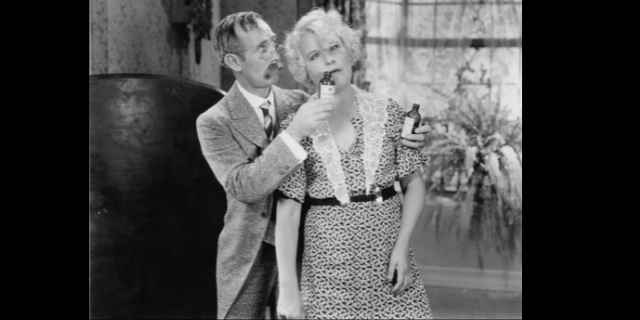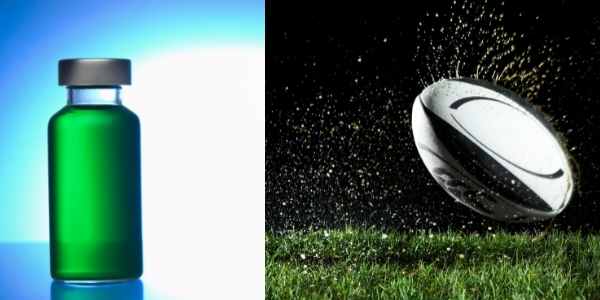It’s not uncommon in other sports to see players sniffing or inhaling something before a match, or even during breaks in play. This wasn’t something that happened in rugby, but it’s now being seen more and more.
So, what are the rugby players sniffing and why?
It’s generally one of two things: smelling salts or nasal sprays. They are entirely different substances and each serves a very specific and very different purpose. This article will explain both.
What Are Smelling Salts?
Smelling salts, also known as ammonia inhalants, are an ancient preparation dating back to at least the Roman Empire.
Modern smelling salts are ammonium carbonate vapor and are sold in containers that work a lot like a glow stick. When the container is snapped, the liquid and solid components mix, releasing the ammonium carbonate gas.
Traditionally, smelling salts were used to revive people who were unconscious due to fainting, illness, or injury. Here’s a still from an old film with a woman being given a hit of salts!

How Do Smelling Salts Work?
Smelling salts work by creating a sudden irritation in the sinuses and lungs which functions almost exactly like a sudden spike of adrenaline.
By stimulating the “fight or flight” response it causes an involuntary change in heart rate. The rate of breathing and blood pressure also increases. This causes the blood to carry more oxygen.
Why Do Some Rugby Players Use Smelling Salts?

Smelling salts, when used correctly, may provide these benefits:
- aid mental clarity
- reduce fatigue
- boost performance and energy on the pitch.
All of this makes the athlete feel more energetic, more able to focus, and less tired. With this in mind, the usefulness of smelling salts in rugby is easy to see.
They can be used to either pump a player up to take the field or revive the energy and focus of a tired player.
Short term benefits
Like adrenaline, the boost from smelling salts is short-term, lasting for a few minutes at most.
The psychological boost it gives the player may very well last longer. It is also very useful to help a player to get over the effect of pre-match nerves.
By the time the salts wear off, the player is into the game and not nervous anymore. The mere confidence they gave can be a huge help.
If used correctly, smelling salts are totally safe.
It’s theoretically possible that prolonged use could result in tissue damage to the sinuses or lungs, or that they could become addictive. However, the smell is so unpleasant that this is hardly likely.
Smelling Salts Are No Longer Used For Reviving Players
The original use of smelling salts was to revive unconscious players.
This is no longer considered appropriate in a sporting context. One of the reasons is the characteristic head jerk associated with inhaling smelling salts.
Since people knocked unconscious can be at risk for brain or neck injury, that sudden snap of the head can actually make potential injuries worse.
Aside from the head jerk, the sporting authorities in rugby have created very strict protocols for dealing with loss of consciousness and other head injuries. These apply from the top professionals right down to school level.
Smelling salts Are No Longer Used To Overcome Concussions
Smelling salts were also used for milder concussions to “clear” the player’s head. The goal was to get players to push through their injury and keep playing.
This is no longer considered safe or correct use in sport.
Concussions are no longer viewed as an injury that it is safe for a player to tough their way through. So, using salts for concussion treatment is frowned upon.
The use is actually banned in boxing in most places because of this.

Are Smelling Salts Common In Other Sports?
Smelling salts are very common in sport, worldwide.
Before its ban in boxing, smelling salts and the boxing ring were practically synonymous.
You can also see English football players using smelling salts in photos from the 1940s. Since smelling salts were a common part of any doctor’s supplies since the 1800s, we have no way to guess how long they have been in use.
Current usage in other sports
Olympic lifters, powerlifters, and arm wrestlers will inhale smelling salts before a maximum effort.
Today their use is common in soccer, hockey, football, baseball, and, especially, in the NFL.
Smelling salts are used through the NFL at an amazing rate. Famous players like Tom Brady, Payton Manning, and Brett Favre all openly relied on them.
The stop-and-start nature of NFL football makes it perfect for smelling salts because the whole game is about short bursts of maximum effort.
Weirdly, it’s even very common to see NFL coaches on the sideline crack open some smelling salts and inhale them during a match.

Nasal Sprays In Rugby
When you see a rugby player sniffing from a small bottle, don’t assume that smelling salts are involved. It may be a nasal spray. So, let’s now look at these in detail.
Nasal sprays are designed to keep athletes’ noses, sinuses, and airways open and to aid in breathing.
They are commonly of two types: a medicated spray that contains some type of allergy medicine or antihistamine, or a saline spray.
Why Do Some Rugby Players Use Nasal Sprays?
Rugby is a sport with an incredibly high aerobic demand. Because of this, anything the player can do to improve his breathing will help his play.
Medicated sprays
The medicated sprays are fairly self-explanatory. They reduce or eliminate any blockage or swelling due to allergies or inflammation, opening up the player’s passages for maximum airflow.
More airflow equals more energy and more effort, which equals better play.
Saline sprays
Saline sprays are probably the most innocuous and least controversial type of spray. These sprays act as a wash to clear out the nasal passages.
They can either come in a pressurized can or a squeeze bottle.
The saline solution rinses out the sinuses and nasal passages to
- remove pollen, dust, and other allergens
- wash out mucus or blood
- reduce swelling.
This also opens up the airways and does it without any drugs that may affect the player in other ways.
Since the saline rinse is drug-free, it can be used as often as needed. The player also never needs to worry about any potential doping issues arising from a saline spray.
Our top pick saline spray
Are Nasal Sprays Common In Other Sports?
Nasal sprays are very common in swimming, soccer, NFL football, hockey, and any other sport with high aerobic demand.
Watch a boxer return to his corner in a match between rounds. One of the first things you see is the trainer holding a saline squeeze bottle up to each nostril of the fighter.
This is to blow out the blood and mucus build up so that the fighter can breathe properly.

Soccer players also use nasal sprays routinely.
Sometimes you’ll spot a player coming out of the tunnel with the front of his jersey seemingly wet. Players may douse their jerseys in the spray to get the maximum effects.